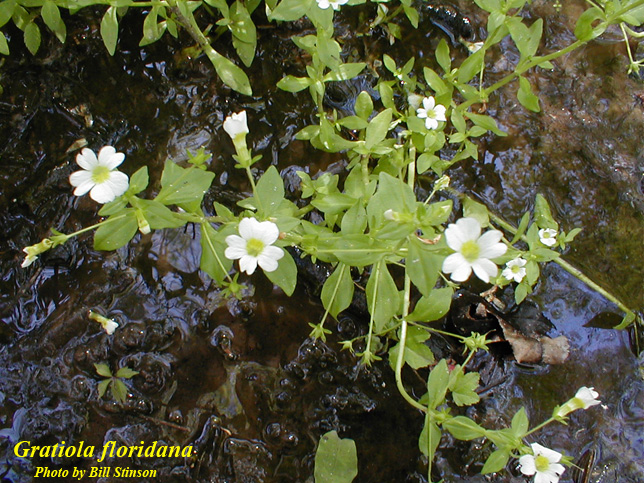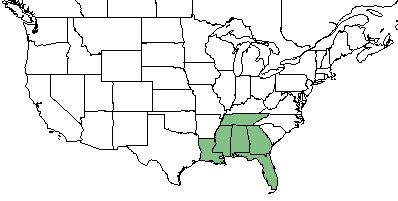Difference between revisions of "Gratiola floridana"
| Line 37: | Line 37: | ||
===Phenology=== <!--Timing off flowering, fruiting, seed dispersal, and environmental triggers. Cite PanFlora website if appropriate: http://www.gilnelson.com/PanFlora/ --> | ===Phenology=== <!--Timing off flowering, fruiting, seed dispersal, and environmental triggers. Cite PanFlora website if appropriate: http://www.gilnelson.com/PanFlora/ --> | ||
| − | + | ''G. floridana'' has been observed to flower in March <ref name= "Panflora"> Nelson, G. PanFlora: Plant data for the eastern United States with emphasis on the Southeastern Coastal Plains, Florida, and the Florida Panhandle. www.gilnelson.com/PanFlora/ Accessed: 22 MAY 2018 </ref>, but it has been seen to flower in April and May as well. Fruiting time ranges from March until April. <ref name= "Herbarium"/> | |
<!--===Seed dispersal===--> | <!--===Seed dispersal===--> | ||
<!--===Seed bank and germination===--> | <!--===Seed bank and germination===--> | ||
Revision as of 15:37, 2 November 2018
Common name: Florida hedgehyssop
| Gratiola floridana | |
|---|---|

| |
| Photo by the Atlas of Florida Plants Database | |
| Scientific classification | |
| Kingdom: | Plantae |
| Division: | Magnoliophyta - Flowering plants |
| Class: | Magnoliopsida - Dicots |
| Order: | Scrophulariales |
| Family: | Scrophulariaceae |
| Genus: | Gratiola |
| Species: | G. floridana |
| Binomial name | |
| Gratiola floridana Nutt. | |

| |
| Natural range of Gratiola floridana from USDA NRCS Plants Database. | |
Contents
Taxonomic Notes
Synonyms: none
Varieties: none
Description
Also known as the Florida hedgehyssop, G. floridana is a native annual forb that is a member of the Scrophulariaceae family [1].
Distribution
G. floridana is found in the Southeast United States, ranging from Louisiana and Florida to less frequently found in Tennessee [1].
Ecology
Habitat
G. floridana can be found in spring runs, steam banks, and blackwater swamps [2]. It has specifically been seen in shaded wet muck of floodplains, and partially shaded mesic firebreak trails. [3]
Associated species - Ludwigia palustris [3]
Phenology
G. floridana has been observed to flower in March [4], but it has been seen to flower in April and May as well. Fruiting time ranges from March until April. [3]
Conservation and Management
It is considered endangered in the state of Tennessee but not in any other region, but G. floridana should be monitored in the communities for its infrequency [1].
Cultivation and restoration
Photo Gallery
References and notes
- ↑ 1.0 1.1 1.2 USDA Plants Database URL: https://plants.usda.gov/core/profile?symbol=GRFL2
- ↑ Weakley, A. S. (2015). Flora of the Southern and Mid-Atlantic States. Chapel Hill, NC, University of North Carolina Herbarium.
- ↑ 3.0 3.1 3.2 Florida State University Robert K. Godfrey Herbarium database. URL: http://herbarium.bio.fsu.edu. Last accessed: June 2018. Collectors: Loran C. Anderson, David Roddenberry, Robert K. Godfrey, R. Kral, and J. M. Kane. States and counties: Florida: Gadsden, Wakulla, Jackson, and Leon. Georgia: Thomas. Alabama: Etowah, and Dallas.
- ↑ Nelson, G. PanFlora: Plant data for the eastern United States with emphasis on the Southeastern Coastal Plains, Florida, and the Florida Panhandle. www.gilnelson.com/PanFlora/ Accessed: 22 MAY 2018